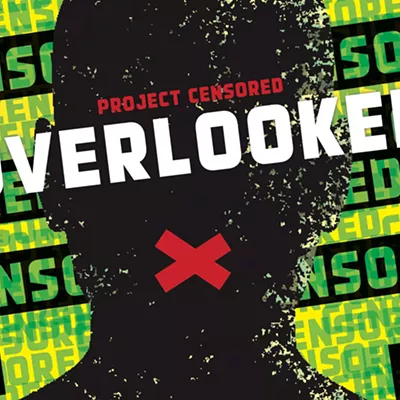Going National
[
{
"name": "Broadstreet - Instory",
"component": "25846487",
"insertPoint": "4",
"requiredCountToDisplay": "4"
},{
"name": "Broadstreet - Empower Local",
"component": "27852456",
"insertPoint": "8",
"requiredCountToDisplay": "8"
},{
"name": "Broadstreet - Instory",
"component": "25846487",
"insertPoint": "12",
"requiredCountToDisplay": "12"
},{
"name": "Broadstreet - Instory - 728x90 / 970x250",
"component": "27852677",
"insertPoint": "18",
"requiredCountToDisplay": "18"
},{
"name": "Broadstreet - Instory",
"component": "25846487",
"insertPoint": "5th",
"startingPoint": "23",
"requiredCountToDisplay": "24",
"maxInsertions": 100
}
]
by Ann M. Colford, Marty Demarest, Ted S. McGregor Jr., Kevin Taylor & r & & r & & lt;span class= "dropcap " & T & lt;/span & his was the year when our beloved regional writers broke their geographical bonds and landed on the nation's stage. When the National Book Award nominations came out, two Spokane products, Jess Walter -- nominated in fiction for The Zero -- and Timothy Egan -- nominated in nonfiction for The Worst Hard Time -- were on the list.
Egan, who won the NBA for nonfiction, lives in Seattle, where he's the New York Times regional bureau chief, but he has deep local roots, having graduated from Gonzaga Prep. Egan's second book, Breaking Blue, was about Spokane, and the nation's oldest unsolved mystery.
Not long ago, writers felt like they had to leave Spokane to prosper, as Sherman Alexie did when he moved to Seattle in the 1990s. But Walter, an East Valley High School grad and former Spokesman-Review reporter, has proven you can work here and get noticed.
Of course it's plain to see that both writers found a national audience and critical praise when they wrote books not set in the Pacific Northwest. But that's probably how it works for regional writers. At least now the rest of the country will understand what we have known around here for some time: You don't have to come from the deep South or live in New York City to be a great writer. (TSM)
10) The Innocent Man by John Grisham
The king of legal thrillers dives into his first nonfiction book with a story that, by his own admission, beats anything he could have imagined. It's the tale of former small-town sports hero Ron Williamson, who is wrongly convicted of a grisly murder and sentenced to death. Although he was eventually exonerated by DNA evidence, Williamson had already sunk into chronic mental illness and died soon after. His obituary triggered Grisham's curiosity. (AC)
9) Mayflower by Nathaniel Philbrick
Thanksgiving has been whitewashed over the centuries, which gives Philbrick a chance to get the story right. Oddly enough, Philbrick spends most of the book detailing King Philip's War, which broke out a generation after that first feast. This story includes as much about Indians as it does about Puritans, and we can all be thankful for that. (TSM)
8) Triangle by Katharine Weber
Every one of us finds a way to tell our own story, to assemble the chaos of daily living into some kind of coherent narrative. We gloss over details here, presenting ourselves in perhaps a more flattering light than we deserve. The fragility of constructed identities lies at the heart of Weber's novel, the tale of the last living survivor of the 1911 Triangle Shirtwaist Factory fire in New York. (AC)
7) Walt Disney by Neal Gabler
Much more than a rip through an icon, Gabler's impeccably researched biography of Disney examines the effect of one of the 20th century's greatest artists on his country, industry and the people who worked with him from day to day. Surprising, touching and (in the era of mechanically reproduced art) extremely important. (MD)
6) Fiasco by Thomas Ricks
Of all the books on the debacle in Iraq, this is the finest. Among the first to succinctly label it a failure, Fiasco is unassailable for its on-the-ground reporting and for Ricks' lack of an axe to grind. A reporter for the Washington Post who has spent a lot of time embedded and in the Green Zone, Ricks got it right. You could argue the nation's appetite for this war started changing around the time this book came out and leaders were forced to admit their failures. (TSM)
5) The Road by Cormac McCarthy
Years after a nuclear holocaust, a man and his boy wander an American South where ransacked buildings still stand but all the animals are dead. The father and son wander toward the sea. In McCarthy's hands, a desolate tale of creeping horror and the struggle to survive reads like poetry. (MB)
4) God Laughs and Plays by David James Duncan
Another Northwest writer who transcended the geography with his latest book, Duncan left his childhood scripture-quoting fundamentalism behind and immersed himself in the "Wisdom literature" of mystics from the world's faith traditions and philosophies. He no longer calls himself a Christian, but he embraces a kind of post-Christianity, where enlightened people can be God's hands on Earth. These essays comprise something like an easy-going jeremiad, a sermon in poetry's clothing that might just save a few souls. (AC)
3) The Omnivore's Dilemma by Michael Pollan
One of the great achievements in nonfiction lately, Pollan followed up his buzzworthy The Botany of Desire with the story of something important -- crucial, actually -- to all of us: food. Where it comes from, how it gets to our tables, what they're putting into it. It's generally entertaining, often troubling, but always enlightening. After you read this, you will be empowered to make better choices about what you put in your body. (TSM)
2) The Worst Hard Time by Timothy Egan
Timothy Egan painstakingly lays out the forces -- both natural and manmade -- that turned a vast stretch of breathtakingly beautiful grasslands into a raging hell that whipped the breath away from the people who had settled there. Egan's book on the Dust Bowl that ravaged the lands around the Oklahoma panhandle during the 1930s is filled with plenty of pain -- physical, mental and spiritual. But it is a story also of endurance, hope and, thanks to clear-sighted soils scientist Hugh Bennett, of emergence. (KT)
1) The Zero by Jess Walter
Set in New York City immediately following the terrorist attacks of 9/11, this is the first time Walter has strayed so far from Spokane -- although some of the action in Citizen Vince landed in the Big Apple as well. In The Zero, Walter's protagonist, Brian Remy, is a city cop who wakes up to find that he's shot himself in the head -- the bullet just grazing his temple -- and he has no memory of what led to it. That's only the beginning of Remy's dissociative condition as he reels through the days following the horrific terrorist attack on his city. Walter uses Remy's drop-in, drop-out awareness as a metaphor for what he sees as our national passivity and militant normalcy in light of 9/11. But despite the story's dark tones, Walter keeps the wit flowing, as the absurd cohabitates with the tragic. (AC)
Timothy Egan's Top Five
Joan Didion's memoir, THE YEAR OF MAGICAL THINKING, which won the National Book Award last year. Blew me away. I've always loved her, and this book is so raw and honest.
Bob Woodward's book on Bush and the war, STATE OF DENIAL, easily his best book in the trilogy on Bush. Read it now and weep. Read it in 50 years for history, and weep.
Phil Caputo's novel, ACTS OF FAITH, about Africa and missionaries gone back. A terrific epic novel.
Eric Larson's THUNDERSTRUCK. This guy now owns popular narrative history.
A novel, THE KITE RUNNER, by Khaled Hosseini. I realize this book is a few years old, but our whole family read it this year. Reads like Charles Dickens in the Muslim world.
-- TIMOTHY EGAN
Jess Walter's Top Five
THE TURNING by Tim Winton
Linked short stories by the best writer in Australia, these pieces come and go in time and change tense and point of view and give you a full, three-dimensional view of a place and a family.
THE ECHO MAKER by Richard Powers
Beautifully written, thoroughly imagined and deeply thought, a novel about the mystery of memory and the endless possibilities of the mind. Powers is brilliant.
READING LIKE A WRITER by Francine Prose
A great book about writing and reading. Prose starts simply, with chapters about words, sentences and paragraphs, and ends grandly with Chekhov.
BLACK SWAN GREEN by David Mitchell
A tight, evocative novel about a boy growing up in England. Mitchell juggled narrative chainsaws in his last book, my favorite book of 2005, Cloud Atlas. Here he goes smaller, writing with a funny, effortless voice.
THE LAY OF THE LAND by Richard Ford
Frank Bascombe, the hilariously self-destructive "hero" of Ford's The Sportswriter and Independence Day, spends a memorable Thanksgiving experiencing a cross-cut of millennial American strangeness.
-- JESS WALTER
Egan, who won the NBA for nonfiction, lives in Seattle, where he's the New York Times regional bureau chief, but he has deep local roots, having graduated from Gonzaga Prep. Egan's second book, Breaking Blue, was about Spokane, and the nation's oldest unsolved mystery.
Not long ago, writers felt like they had to leave Spokane to prosper, as Sherman Alexie did when he moved to Seattle in the 1990s. But Walter, an East Valley High School grad and former Spokesman-Review reporter, has proven you can work here and get noticed.
Of course it's plain to see that both writers found a national audience and critical praise when they wrote books not set in the Pacific Northwest. But that's probably how it works for regional writers. At least now the rest of the country will understand what we have known around here for some time: You don't have to come from the deep South or live in New York City to be a great writer. (TSM)
10) The Innocent Man by John Grisham
The king of legal thrillers dives into his first nonfiction book with a story that, by his own admission, beats anything he could have imagined. It's the tale of former small-town sports hero Ron Williamson, who is wrongly convicted of a grisly murder and sentenced to death. Although he was eventually exonerated by DNA evidence, Williamson had already sunk into chronic mental illness and died soon after. His obituary triggered Grisham's curiosity. (AC)
9) Mayflower by Nathaniel Philbrick
Thanksgiving has been whitewashed over the centuries, which gives Philbrick a chance to get the story right. Oddly enough, Philbrick spends most of the book detailing King Philip's War, which broke out a generation after that first feast. This story includes as much about Indians as it does about Puritans, and we can all be thankful for that. (TSM)
8) Triangle by Katharine Weber
Every one of us finds a way to tell our own story, to assemble the chaos of daily living into some kind of coherent narrative. We gloss over details here, presenting ourselves in perhaps a more flattering light than we deserve. The fragility of constructed identities lies at the heart of Weber's novel, the tale of the last living survivor of the 1911 Triangle Shirtwaist Factory fire in New York. (AC)
7) Walt Disney by Neal Gabler
Much more than a rip through an icon, Gabler's impeccably researched biography of Disney examines the effect of one of the 20th century's greatest artists on his country, industry and the people who worked with him from day to day. Surprising, touching and (in the era of mechanically reproduced art) extremely important. (MD)
6) Fiasco by Thomas Ricks
Of all the books on the debacle in Iraq, this is the finest. Among the first to succinctly label it a failure, Fiasco is unassailable for its on-the-ground reporting and for Ricks' lack of an axe to grind. A reporter for the Washington Post who has spent a lot of time embedded and in the Green Zone, Ricks got it right. You could argue the nation's appetite for this war started changing around the time this book came out and leaders were forced to admit their failures. (TSM)
5) The Road by Cormac McCarthy
Years after a nuclear holocaust, a man and his boy wander an American South where ransacked buildings still stand but all the animals are dead. The father and son wander toward the sea. In McCarthy's hands, a desolate tale of creeping horror and the struggle to survive reads like poetry. (MB)
4) God Laughs and Plays by David James Duncan
Another Northwest writer who transcended the geography with his latest book, Duncan left his childhood scripture-quoting fundamentalism behind and immersed himself in the "Wisdom literature" of mystics from the world's faith traditions and philosophies. He no longer calls himself a Christian, but he embraces a kind of post-Christianity, where enlightened people can be God's hands on Earth. These essays comprise something like an easy-going jeremiad, a sermon in poetry's clothing that might just save a few souls. (AC)
3) The Omnivore's Dilemma by Michael Pollan
One of the great achievements in nonfiction lately, Pollan followed up his buzzworthy The Botany of Desire with the story of something important -- crucial, actually -- to all of us: food. Where it comes from, how it gets to our tables, what they're putting into it. It's generally entertaining, often troubling, but always enlightening. After you read this, you will be empowered to make better choices about what you put in your body. (TSM)
2) The Worst Hard Time by Timothy Egan
Timothy Egan painstakingly lays out the forces -- both natural and manmade -- that turned a vast stretch of breathtakingly beautiful grasslands into a raging hell that whipped the breath away from the people who had settled there. Egan's book on the Dust Bowl that ravaged the lands around the Oklahoma panhandle during the 1930s is filled with plenty of pain -- physical, mental and spiritual. But it is a story also of endurance, hope and, thanks to clear-sighted soils scientist Hugh Bennett, of emergence. (KT)
1) The Zero by Jess Walter
Set in New York City immediately following the terrorist attacks of 9/11, this is the first time Walter has strayed so far from Spokane -- although some of the action in Citizen Vince landed in the Big Apple as well. In The Zero, Walter's protagonist, Brian Remy, is a city cop who wakes up to find that he's shot himself in the head -- the bullet just grazing his temple -- and he has no memory of what led to it. That's only the beginning of Remy's dissociative condition as he reels through the days following the horrific terrorist attack on his city. Walter uses Remy's drop-in, drop-out awareness as a metaphor for what he sees as our national passivity and militant normalcy in light of 9/11. But despite the story's dark tones, Walter keeps the wit flowing, as the absurd cohabitates with the tragic. (AC)
Timothy Egan's Top Five
Joan Didion's memoir, THE YEAR OF MAGICAL THINKING, which won the National Book Award last year. Blew me away. I've always loved her, and this book is so raw and honest.
Bob Woodward's book on Bush and the war, STATE OF DENIAL, easily his best book in the trilogy on Bush. Read it now and weep. Read it in 50 years for history, and weep.
Phil Caputo's novel, ACTS OF FAITH, about Africa and missionaries gone back. A terrific epic novel.
Eric Larson's THUNDERSTRUCK. This guy now owns popular narrative history.
A novel, THE KITE RUNNER, by Khaled Hosseini. I realize this book is a few years old, but our whole family read it this year. Reads like Charles Dickens in the Muslim world.
-- TIMOTHY EGAN
Jess Walter's Top Five
THE TURNING by Tim Winton
Linked short stories by the best writer in Australia, these pieces come and go in time and change tense and point of view and give you a full, three-dimensional view of a place and a family.
THE ECHO MAKER by Richard Powers
Beautifully written, thoroughly imagined and deeply thought, a novel about the mystery of memory and the endless possibilities of the mind. Powers is brilliant.
READING LIKE A WRITER by Francine Prose
A great book about writing and reading. Prose starts simply, with chapters about words, sentences and paragraphs, and ends grandly with Chekhov.
BLACK SWAN GREEN by David Mitchell
A tight, evocative novel about a boy growing up in England. Mitchell juggled narrative chainsaws in his last book, my favorite book of 2005, Cloud Atlas. Here he goes smaller, writing with a funny, effortless voice.
THE LAY OF THE LAND by Richard Ford
Frank Bascombe, the hilariously self-destructive "hero" of Ford's The Sportswriter and Independence Day, spends a memorable Thanksgiving experiencing a cross-cut of millennial American strangeness.
-- JESS WALTER
















